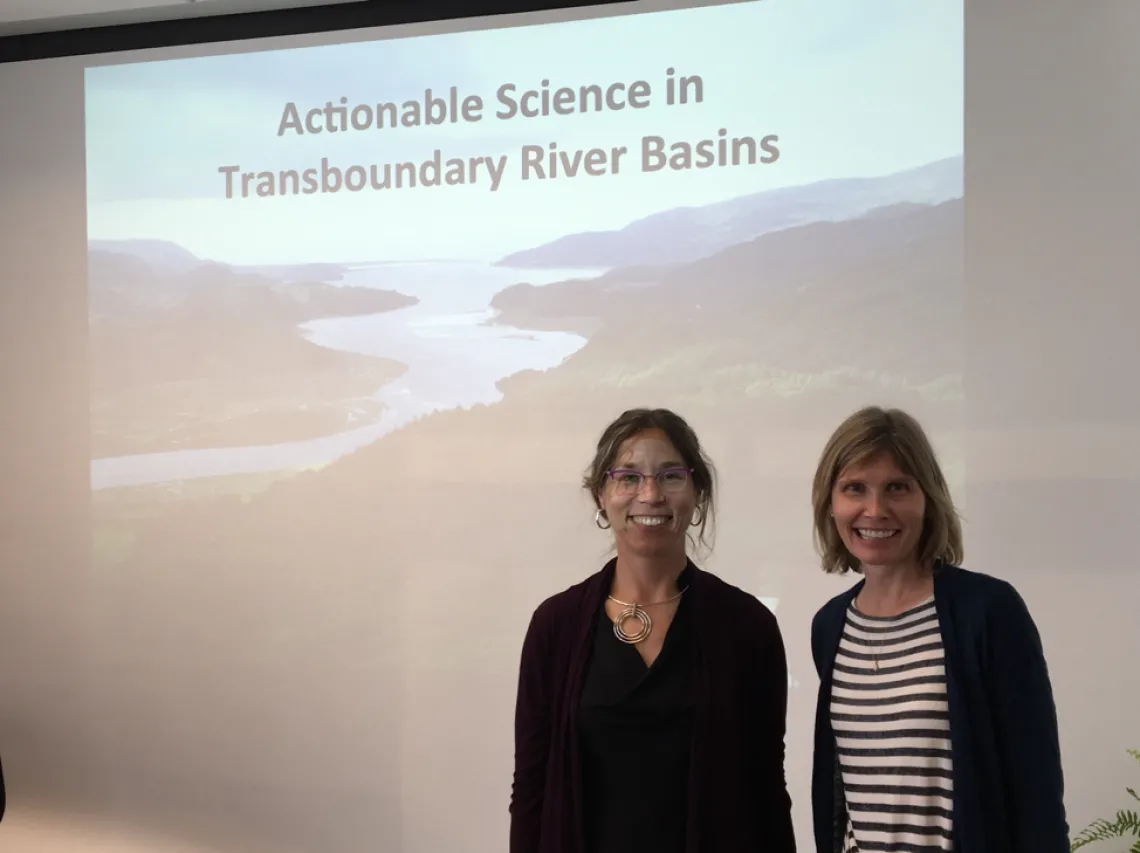Experts from around the world meet to tackle challenges of science and policy making in transboundary river basins

Anita Milman and Andrea K. Gerlak presenting at the workshop.
Photo by Tamee Albrecht
Increasingly, intensifying competition for water resources, changes in the hydro-climatic cycle, and degrading water quality are threatening both humans and ecosystems. These risks are of increasing concern for transboundary river basins, where coordination across international political boundaries adds a dimension of complexity to already challenging governance issues. The effective production of scientific knowledge and incorporation of that knowledge into decision-making is seen as a critical factor influencing how water-related risks are mitigated, and river basins are effectively governed.
On June 25-26, 2018, the U.S. National Socio-Environmental Synthesis Center (SESYNC) sponsored an international workshop in Annapolis, Maryland on science and policy interactions in transboundary waters. The workshop marked the second meeting of a group of scholars and practitioners from around the world collaboratively working to identify promising pathways by which science is developed and informs policy in transboundary basins. The workshop was organized and facilitated by Dr. Andrea K. Gerlak (School of Geography and Development and Udall Center, University of Arizona) and Dr. Anita Milman (Department of Environmental Conservation, University of Massachusetts).
Workshop participants included academics with expertise in transboundary water governance along with officials from three international river basin organizations three institutions -- the International Commission for the Protection of the Danube (ICPDR), the International Joint Commission (IJC) (rivers shared between the US and Canada), and the Mekong River Commission (MRC). These organizations are recognized as leaders in transboundary river governance and have been actively generating scientific knowledge for decades. Together, they facilitate cooperative water governance in transboundary river basins that extend across a total of 27 countries on three continents, and encompass a broad geographic diversity including variation in environmental and water conditions, history, economics, and political features.
The purpose of the workshop was to trace the pathways through the three organizations to understand how science has been produced science and how it has been integrated into policy in several cases that highlight critical transboundary management issues, from pollution to climate change and hydropower development. Cases included updating of the Lake Ontario–St. Lawrence Regulation Plan (IJC) and identification of water quality targets for nutrients in the Red River Basin (IJC); development of a Climate Adaptation Strategy (ICPDR); joint monitoring (ICPDR); and development of a Guidance for Sustainable Hydropower (MRC).
During the workshop, participants examined how the science-policy pathway was influenced by the nature of the problem, the process through which science was produced, engagement with stakeholders, and the RBO’s mandate and jurisdictional authority. Across the cases, workshop participants identified significant commonalities in the challenges faced in international river basins, the need for additional baseline scientific and socio-economic information and data, and the value of engaging with policy-makers from member countries early on in the science production process, among other things.
Workshop outcomes include the creation of descriptive science-policy pathways. These pathways will be analyzed to detect patterns and trends in the science-policy process for transboundary waters and to highlight innovative practices. This workshop is part of a larger project that aims to inform understandings of the science-policy process in transboundary waters and to provide lessons about actionable science for policy-makers to draw upon as they consider how to best develop and enable incorporation of science into decision-making.
To learn more about the larger project please visit: Actionable Science in Transboundary River Basins


